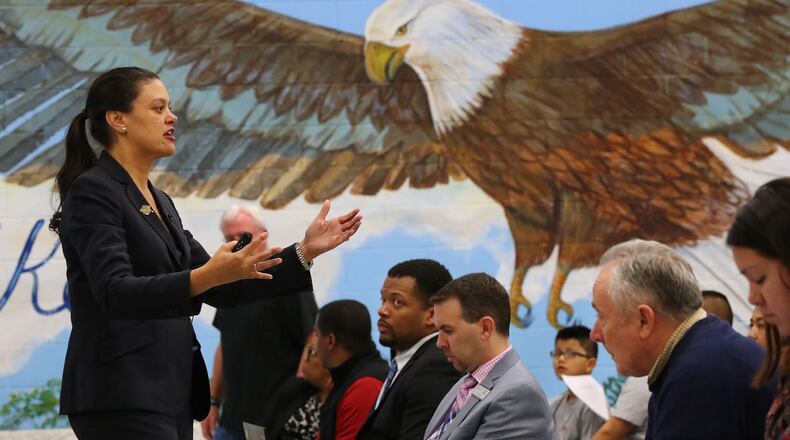The crowd listened intently as Atlanta public schools Superintendent Meria Carstarphen made the case for merging two small elementary schools in east Atlanta during a Wednesday night meeting.
It’s part of a wider and long-lasting plan to deal with declining student populations and save money. Atlanta Public Schools at one point had capacity for 100,000 students, but this year the student population stands at 51,000.
The system has been closing and consolidating schools for years as it works to make facilities fit student needs. But redrawing district lines, closing neighborhood schools that have stood for decades, and merging the politically and racially diverse groups of students is always tricky work.
The schools, Benteen and D.H. Stanton elementary schools, don’t have enough students to fill their respective buildings, and in some cases facilities need major repairs, Carstarphen said. Benteen has 310 students and D.H. Stanton has one of the smallest student populations at 265. The system could save up to $1 million through this closure and merger, according to its estimate.
But the idea of merging Benteen with D.H. Stanton and moving the children to Stanton did not sit well with some parents, student and teachers.
Parents are concerned about everything from an empty school building left behind in their neighborhood to increased class sizes to the quality of students from Stanton, which scored about 15 points lower on the College and Career Readiness Performance Index, a comprehensive state measure of how students are faring.
Teachers and other staff are not happy because they will have to apply for the available jobs at the merged school. Re-employment is not guaranteed.
Carstarphen said the school district will handle the process fairly, as they have done in previous years. She praised teachers and leaders for their efforts to improve academic performance.
“It’s working,” Carstarphen said.
On March 6, the board is expected to vote on this merger and others at its regular 6 p.m. school board meeting. If approved, it will take place in the 2017-18 school year.
Carstarphen told the crowd she had read some of the Facebook posts about the proposed changes to the Maynard Jackson High School cluster, which contains the elementary schools in question. Other schools are also up for closing and redrawing districts. She attempted to address questions in her presentation and has also put information on the district's web site.
Among the reasons that Atlanta has fewer students, which has created a need for mergers, is that nearby charter schools have attracted some some students out of traditional public schools — there are more than a dozen public charter campuses in Atlanta. And a new state-approved charter school setting up nearby is expected to attract another nearly 600 students from Atlanta and DeKalb County. Public housing that contained many students has been torn down, scattering former students elsewhere.
The district is also considering merging students from Whitefoord Elementary into Toomer and Burgess-Peterson elementaries. Both schools have the capacity to house more students and Toomer is scheduled to get a $4 million facelift.
Whitefoord Elementary, with only 272 students, is also one of the smallest elementary schools in the system and the building needs up to $7 million in fixes to restore it to proper standards. Toomer and Burgess-Peterson,have capacity to handle additional children. Projections show that Toomer would take an additional 218 students from Whitefoord students, while Burgess-Peterson would take 69 of them.
The shrinking student population was a phenomenon that started before Carstarphen arrived, and it has left empty buildings across the system. It has about 50 buildings and pieces of property that are not used for school functions. Many are empty, some are rented to other entities.
The school system has been trying to sell surplus properties, but the city of Atlanta holds the deeds and has refused to turn most of them over to the schools. Mayor Kasim Reed recently offered the school system a few of the deeds. The two are tangled in a lawsuit over the deeds.
About the Author
Keep Reading
The Latest
Featured


